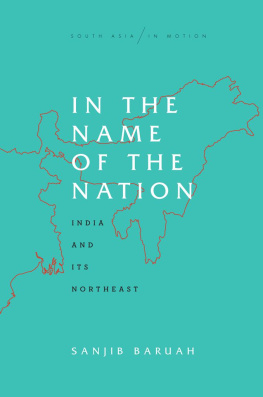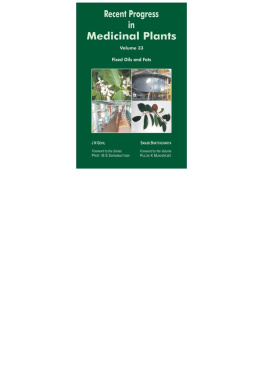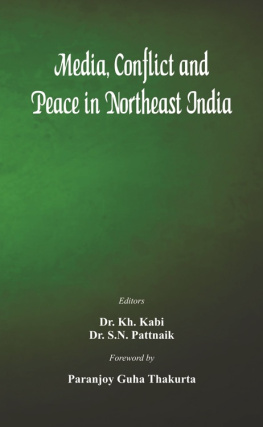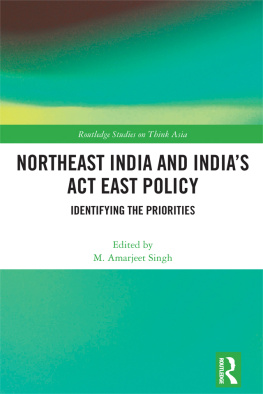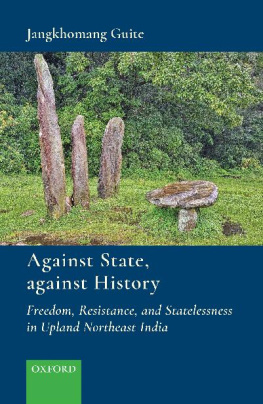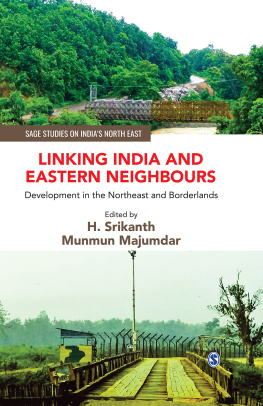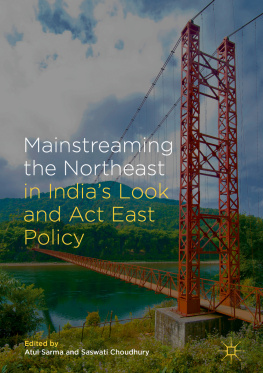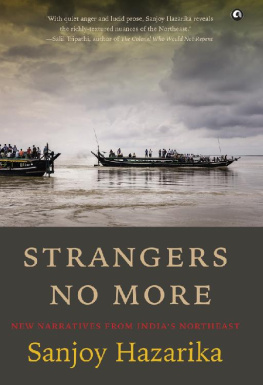Sanjib Baruah - In the Name of the Nation: India and Its Northeast
Here you can read online Sanjib Baruah - In the Name of the Nation: India and Its Northeast full text of the book (entire story) in english for free. Download pdf and epub, get meaning, cover and reviews about this ebook. year: 2020, publisher: Stanford University Press, genre: Politics. Description of the work, (preface) as well as reviews are available. Best literature library LitArk.com created for fans of good reading and offers a wide selection of genres:
Romance novel
Science fiction
Adventure
Detective
Science
History
Home and family
Prose
Art
Politics
Computer
Non-fiction
Religion
Business
Children
Humor
Choose a favorite category and find really read worthwhile books. Enjoy immersion in the world of imagination, feel the emotions of the characters or learn something new for yourself, make an fascinating discovery.
- Book:In the Name of the Nation: India and Its Northeast
- Author:
- Publisher:Stanford University Press
- Genre:
- Year:2020
- Rating:5 / 5
- Favourites:Add to favourites
- Your mark:
- 100
- 1
- 2
- 3
- 4
- 5
In the Name of the Nation: India and Its Northeast: summary, description and annotation
We offer to read an annotation, description, summary or preface (depends on what the author of the book "In the Name of the Nation: India and Its Northeast" wrote himself). If you haven't found the necessary information about the book — write in the comments, we will try to find it.
In the Name of the Nation: India and Its Northeast — read online for free the complete book (whole text) full work
Below is the text of the book, divided by pages. System saving the place of the last page read, allows you to conveniently read the book "In the Name of the Nation: India and Its Northeast" online for free, without having to search again every time where you left off. Put a bookmark, and you can go to the page where you finished reading at any time.
Font size:
Interval:
Bookmark:


IN THE NAME OF THE NATION
India and Its Northeast
SANJIB BARUAH
STANFORD UNIVERSITY PRESS
STANFORD, CALIFORNIA
STANFORD UNIVERSITY PRESS
Stanford, California
2020 by the Board of Trustees of the Leland Stanford Junior University.
All rights reserved.
No part of this book may be reproduced or transmitted in any form or by any means, electronic or mechanical, including photocopying and recording, or in any information storage or retrieval system without the prior written permission of Stanford University Press.
Printed in the United States of America on acid-free, archival-quality paper
Library of Congress Cataloging-in-Publication Data
Names: Baruah, Sanjib, author.
Title: In the name of the nation : India and its northeast / Sanjib Baruah.
Description: Stanford, California : Stanford University Press, 2020. | Series: South Asia in motion | Includes bibliographical references and index.
Identifiers: LCCN 2019018060 (print) | LCCN 2019019807 (ebook) | | ISBN 9781503610705 | ISBN 9781503610705 (cloth: alk. paper) | ISBN 9781503611283 (pbk.:alk. paper) | ISBN 9781503611290 (ebook)
Subjects: LCSH: India, NortheasternPolitics and government. | InsurgencyIndia, NortheasternHistory. | IndiaRelationsIndia, Northeastern. | India, NortheasternRelationsIndia. | IndiaPolitics and government1947
Classification: LCC DS483.62 (ebook) | LCC DS483.62 .B37 2020 (print) | DDC 954/.105dc23
LC record available at https://lccn.loc.gov/2019018060
Cover design: Rob Ehle
Typeset by Kevin Barrett Kane in 10.75/15 Adobe Caslon Pro
SOUTH ASIA IN MOTION
EDITOR
Thomas Blom Hansen
EDITORIAL BOARD
Sanjib Baruah
Anne Blackburn
Satish Despande
Faisal Devji
Christophe Jaffrelot
Naveeda Khan
Stacey Leigh Pigg
Mrinalini Sinha
Ravi Vasudevan
To the memory of my mother,
RENU BARUA,
who passed away on November 9, 2018,
as I was completing this manuscript
INDIAS EFFORTS TO BUILD a multilingual, multireligious, and multicultural democratic society, and the conflicts that arise along its many fault lines, attract significant scholarly and media attention. But the experience of Northeast Indiaa region that includes vast tracts of borderland space fringing Bhutan, Chinas Tibetan areas, Myanmar, Bangladesh, and Nepalstands out as distinctive and different. A profusion of small language communities, tribes, and subtribes inhabit certain parts of this region, and this can convey the impression of an almost opaque multiplicity. But cultural boundaries in those areas are in fact quite fluid. The census numbers paint a religious landscape where Hindus are a majority; Islam, Christianity, and Buddhism have a strong presence; and local religious traditions and practices remain influential. Christians make up a majority in three of eight northeastern states and a significant minority in two other states.
The region is an anomalous zone in the republic, where certain basic rules and norms of democracy are rendered ineffective for long periodsor they can be suspended on short notice. Ethnic militias and armed groups have flourished there for decades. But these militarized organizations coexist comfortably with functioning electoral institutions. Special security laws produce severe democracy deficits that are now almost as old as the republic. The brunt of these laws falls on relatively small areas, and politically sensitive and media-intensive urban areas are left out of their jurisdiction. This is partly what has allowed the unhappy status quo to continueto the chagrin of local rights activists.
This book is about postcolonial Indias troubled relations with this regioncommonly referred to as just the Northeast. The ambivalence associated with borderlands, representational practices that reproduce and reinforce a relation of hierarchy, and a center-periphery interactional dynamic are all part of this story. Many from the region who live in Indias capital city of Delhi and other metropolitan areas complain of being objects of a racialized gaze. But the book goes beyond these specificities. It takes the history of this troubled relationship as a vantage point to reflect on how the generalization of the territorially circumscribed nation-form, and of the sovereignty of the nation-state, has played out since decolonization. I reject the evolutionism that makes these political forms seem inevitable rather than highly contingent artifacts. Can democracy be sustained and deepened under conditions prevailing in the region? This concern informs the books core arguments. Its focus is on contemporary history, but the continuities and ruptures between colonial and postcolonial institutions and practices are an important part of my argument. The text therefore reaches back into the British colonial period from time to time.
My tone is academic, but I have a personal connection to the region. I was born in Shillong, in Northeast India, and I grew up in the region. But it became a focus of my intellectual interest much laterafter I completed my doctoral work and began teaching at a liberal arts college in the United States. My work on Northeast India has not been formed in an academic discipline or an area studies program. I rely not only on academic research but also on personal memory for some of the events covered herein. Some key moments in the regions postcolonial transition are part of my childhood and teenage memories. Writing about those junctures gave me the feeling of recalling a time not unlike what historian Eric Hobsbawm once called a twilight zone between history and memory.
I have been writing on Northeast India for the past three decades: a period of considerable public and political upheaval in the region. The years coincide with the books temporal focus. I have traveled extensively in the region during this timesometimes walking familiar paths and renewing old connections but mostly traveling to familiar yet unknown places: meeting new people and making new friends. These personal connections have sustained my affection and empathy for the people. I make a special effort to heed the many unheard and frequently misunderstood political voices from the region. Misperceptions and misjudgments about the conflicting political sentiments that prevail in the region have cost Indian democracy dearly.
This book could not have been imagined without the stimulation and challenge of friends, colleagues, and students. The work progressed mainly through conversations in a variety of contexts. Some of the underlying arguments were developed in the course of my teaching classes on political economy and on the workings of the nation-state at Bard College. The initial formulations of the ideas set forth here were prepared as texts of university and public lectures and conference papers. I owe a debt of gratitude to those who invited me to speak on these subjects: Amit Baishya, Meenaxi Barkataki-Ruscheweyh, Urvashi Butalia, Eric de Maaker, Prasenjit Duara, Thomas Blom Hansen, B. G. Karlsson, shild Kols, Yasmin Saikia, Jolle Smadja, Aparna Sundar, Nandini Sundar, Willem van Schendel, and Mlanie Vandenhelsken. A number of recent invitations gave me the opportunity to present and discuss nearly complete chapters of the book. For these occasions I am thankful to Gudrun Bhnemann, Lalita du Perron, Monirul Hussain, Christophe Jaffrelot, Simi Malhotra, Chandan Kumar Sharma, Dina M. Siddique, H. Srikanth, and Jyotirmoy Talukdar. I owe a special thanks to Preeti Gill, at whose behest I began writing this book, though it took a different course and direction from what we envisaged.
Font size:
Interval:
Bookmark:
Similar books «In the Name of the Nation: India and Its Northeast»
Look at similar books to In the Name of the Nation: India and Its Northeast. We have selected literature similar in name and meaning in the hope of providing readers with more options to find new, interesting, not yet read works.
Discussion, reviews of the book In the Name of the Nation: India and Its Northeast and just readers' own opinions. Leave your comments, write what you think about the work, its meaning or the main characters. Specify what exactly you liked and what you didn't like, and why you think so.

